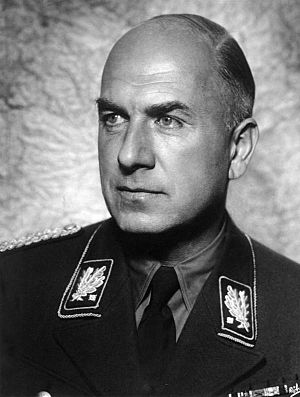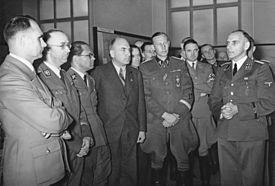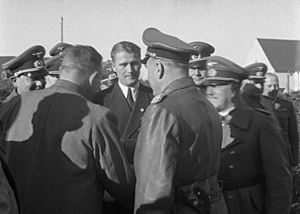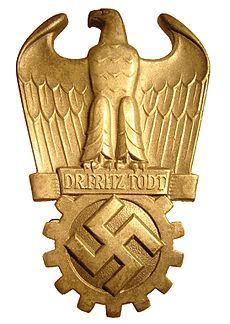Fritz Todt facts for kids
Quick facts for kids
Fritz Todt
|
|
|---|---|

Todt in 1940
|
|
| Reich Minister for Armaments and Munitions | |
| In office 17 March 1940 – 8 February 1942 |
|
| Leader | Adolf Hitler (Führer) |
| Preceded by | Position established |
| Succeeded by | Albert Speer |
| Inspector General for Water and Energy | |
| In office 29 July 1941 – 8 February 1942 |
|
| Preceded by | Position established |
| Succeeded by | Albert Speer |
| General Plenipotentiary for Regulation of the Construction Industry |
|
| In office 9 December 1938 – 8 February 1942 |
|
| Preceded by | Position established |
| Succeeded by | Albert Speer |
| Head of the Organisation Todt | |
| In office May 1938 – 8 February 1942 |
|
| Preceded by | Position established |
| Succeeded by | Albert Speer |
| Inspector General for German Roadways | |
| In office 5 July 1933 – 8 February 1942 |
|
| Preceded by | Position established |
| Succeeded by | Albert Speer |
| Personal details | |
| Born | 4 September 1891 Pforzheim, Grand Duchy of Baden, German Empire (in modern Baden-Württemberg, Germany) |
| Died | 8 February 1942 (aged 50) near Rastenburg, East Prussia, Nazi Germany (modern Kętrzyn, Poland) |
| Resting place | Invalids' Cemetery, Berlin |
| Political party | Nazi Party |
| Parents | Emil Todt (father) Elise Unterecker (mother) |
| Alma mater | Technical University of Munich and Karlsruhe Institute of Technology |
| Profession | Civil engineer |
| Known for | Chief of Organisation Todt |
| Cabinet | Hitler Cabinet |
| Civilian awards | German Order |
| Military service | |
| Allegiance | |
| Branch/service | Luftstreitkräfte Luftwaffe |
| Years of service | 1914–1918 1939–1942 |
| Rank | Leutnant of the reserves Generalmajor SA-Obergruppenführer |
| Battles/wars | World War I World War II |
| Military awards | Iron Cross |
Fritz Todt (born September 4, 1891 – died February 8, 1942) was a German engineer. He became a very important person in Nazi Germany. He was known for building the famous German autobahns (highways). Later, he became the Minister for Armaments and Munitions. In this role, he managed Germany's entire military production during World War II.
Before the war, Todt started a large construction group called Organisation Todt. This group built important military defenses, like the Westwall and the Atlantic Wall. They used many workers from countries Germany had taken over. Todt died in a plane crash in 1942.
Contents
Early Life and Education
Fritz Todt was born in Pforzheim, a town in what was then the Grand Duchy of Baden. His father, Emil Todt, owned a small factory that made rings.
In 1910, Todt joined the military for one year. From 1911 to 1914, he studied engineering. He attended the Technical University of Munich and the Karlsruhe Institute of Technology. He earned a degree in construction engineering.
During World War I, he first served as an infantry soldier. Later, he became a reconnaissance observer in the German Air Force (Luftstreitkräfte). He was awarded the Iron Cross for his service. After the war, he finished his studies in 1920.
Career and Major Projects
In 1921, Todt started working for engineering companies. He joined the Nazi Party in January 1922. In 1931, he also joined the Sturmabteilung (SA), a Nazi organization. He rose through its ranks, becoming an SA-Obergruppenführer by 1938. In 1932, he earned his doctorate in engineering. His thesis was about fixing problems in building roads with tar and asphalt.

Building the Autobahns
In July 1933, Adolf Hitler made Todt the Generalinspektor für das deutsche Straßenwesen. This means he was the Inspector General for German Roadways. His main job was to organize the building of the new German highways, known as Reichsautobahnen. This project was very important to Hitler. Todt was directly in charge of this huge construction effort.
His work on the autobahns made him well-known. Hitler even gave him the German National Prize for Art and Science in 1937. This award was created by Hitler to replace the Nobel Prize, which Germans were forbidden from accepting.
Leading Organisation Todt
In May 1938, Todt started the Organisation Todt (OT). This was a massive construction group that combined government and private companies. It also used the Reichsarbeitsdienst (Reich Labour Service). The OT was responsible for building many important projects.
During World War II, the Organisation Todt built the "West Wall," also known as the "Siegfried Line." This was a line of defenses on Germany's western border. They also built parts of the Atlantic Wall, a long line of defenses along the coast of Western Europe. The OT used up to 800,000 workers, many of whom were people made to work from countries that Germany had occupied.
Minister for Armaments
On March 17, 1940, Todt became the Reichsminister für Bewaffnung und Munition. This means he was the Minister for Armaments and Munitions. In this role, he was in charge of all military production for Germany. He made sure the army had enough weapons and supplies.
After Germany invaded the Soviet Union in June 1941, Todt was put in charge of repairing damaged infrastructure there. He also became the Inspector General for Water and Energy. During this time, he started to disagree with other high-ranking officials, including Hermann Göring. After visiting the Eastern Front, Todt told Hitler that the war against the Soviet Union should end. He believed Germany's military did not have enough equipment and supplies to win. Hitler did not agree with Todt's assessment.
Death
On February 8, 1942, Fritz Todt died in a plane crash. His plane crashed shortly after taking off from an airfield near Rastenburg in East Prussia. He was buried in the Invalids' Cemetery in Berlin. After his death, he was the first person to receive the new Deutscher Orden (German Order), a high honor.
Some people have suggested that Todt's death was not an accident. They thought he might have been assassinated because he wanted Hitler to make peace with Russia. However, this has never been proven. Todt's successor as Minister was Albert Speer. Speer later wrote that the official investigation into the crash ruled out sabotage, which he found "curious."
Legacy
On February 8, 1944, two years after Todt's death, Hitler created the Dr.-Fritz-Todt-Preis. This was a special Badge of Honor for the Nazi Party. It was given for "innovative accomplishments" that helped improve weapons, ammunition, and military equipment. It also honored those who saved labor, raw materials, and energy. The award came in gold, silver, or steel, along with a prize and a certificate. Hitler himself presented the gold award.
Major Awards
- 1918 Iron Cross
- 1937 Werner von Siemens Ring
- 1938 German National Prize for Art and Science
- 1939 Grand Cross of the Order of the Crown of Italy
- 1942 German Order
See also
 In Spanish: Fritz Todt para niños
In Spanish: Fritz Todt para niños
- Economy of Nazi Germany
- Forced labour under German rule during World War II
- Nazi architecture
 | William Lucy |
 | Charles Hayes |
 | Cleveland Robinson |



